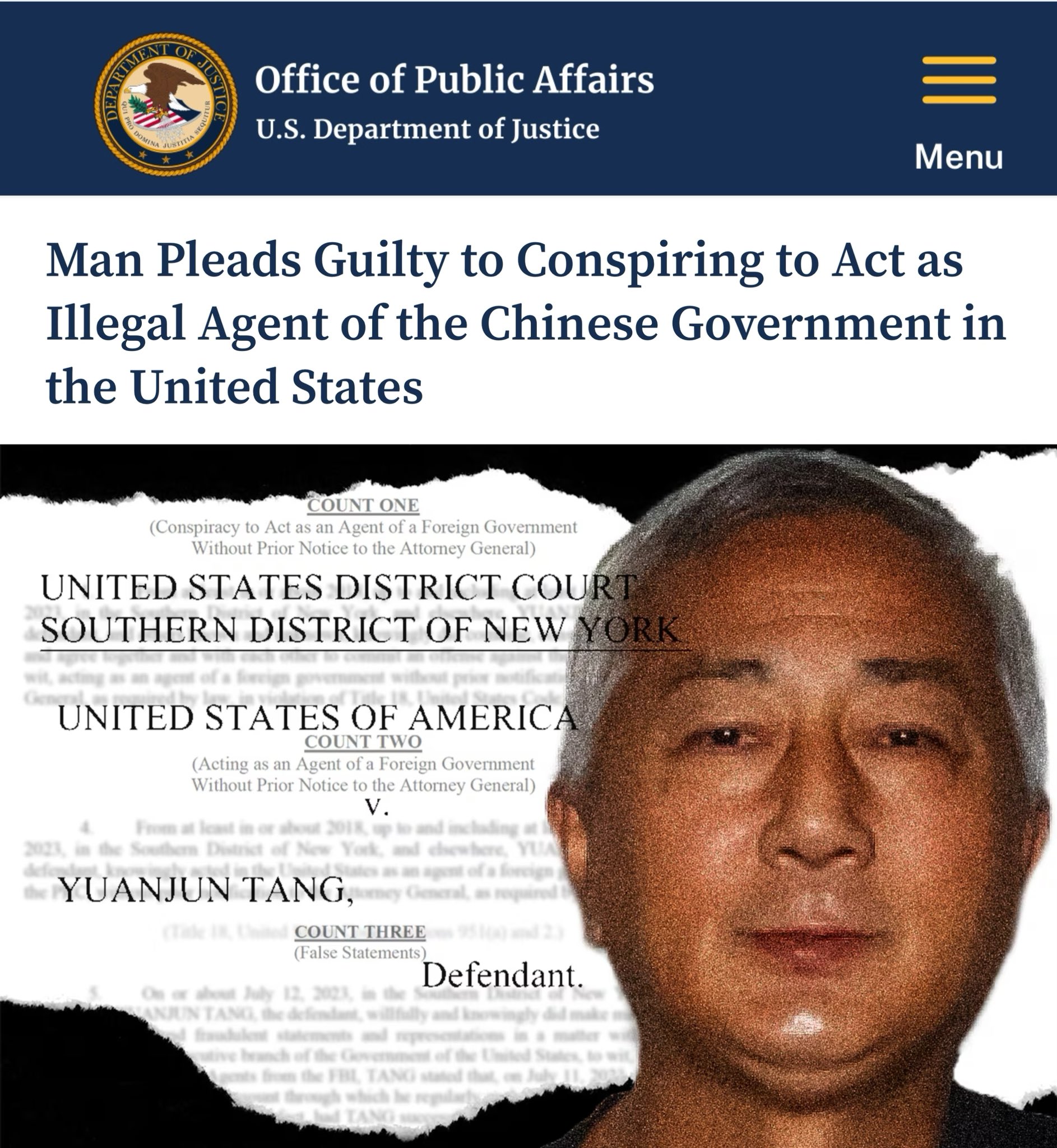September 17, 2025 – New York City
Turkistan Times - A prominent Chinese dissident living in New York has pleaded guilty to acting as an illegal agent of the Chinese government, in a case that U.S. authorities say highlights Beijing’s expanding campaign of “transnational repression” targeting critics abroad.
Yuanjun Tang, 68, a naturalized U.S. citizen and longtime pro-democracy activist, admitted in federal court on Tuesday that he conspired to provide information about fellow dissidents to China’s Ministry of State Security (MSS), the country’s top civilian intelligence agency. He faces up to five years in prison when sentenced in January 2026, according to the U.S. Department of Justice statement released on Sept. 16.
Court documents and reporting by Newsday indicate that Tang’s activities stretched from at least 2018 to 2023. During this period, he allegedly gathered names, photographs, and recordings of individuals participating in pro-democracy protests in New York, including a 2023 vigil for the victims of the Tiananmen Square massacre. He also passed along details about immigration attorneys assisting asylum seekers and infiltrated encrypted group chats used by Chinese activists in the United States.
Tang received payments from Chinese intelligence officers and traveled multiple times to Macau and mainland China for in-person meetings, where he underwent questioning and polygraph tests. On one occasion, he allowed an MSS officer to install surveillance software on his phone to enable real-time data transfers. Investigators later recovered a trove of electronic evidence, including encrypted instructions from the MSS and extensive records of his espionage activities.
The revelations come as Washington intensifies efforts to counter Beijing’s attempts to monitor and silence critics overseas. In recent years, the U.S. Justice Department has charged individuals accused of running secret police outposts in Manhattan’s Chinatown and convicting others of spying on behalf of China against Hong Kong democracy activists, Tibetan advocates, and supporters of Taiwanese independence.
Last summer, a Chinese American scholar, Shujun Wang, who also co-founded a New York-based pro-democracy group, was convicted on charges of gathering information for the Chinese on Hong Kong democracy protesters, supporters of Taiwanese independence, Uyghur and Tibetan activists and others.
The case also resonates with the broader Chinese diaspora communities in the United States, including Uyghur exiles, who have long reported harassment and threats. Activists say Beijing often pressures overseas Uyghurs by intimidating their relatives in East Turkistan, where widespread human rights abuses have been documented. These tactics, according to human rights groups, are designed to deter advocacy and stifle dissent far beyond China’s borders.
Federal prosecutors described Tang’s conduct as a betrayal of both the dissident movement he once helped lead and the democratic values of his adopted homeland. “Tang’s betrayal of the ideals of the United States to help the Chinese government repress pro-democracy activists goes against the very values he claimed to promote,” FBI Assistant Director in Charge Christopher G. Raia said in comments cited by Newsday.
Tang’s fall is particularly striking given his own history. He was once a student protester during the 1989 Tiananmen Square movement, serving 12 years in a Chinese prison before fleeing to Taiwan and later gaining asylum in the United States in 2002. In Queens, he founded a nonprofit organization dedicated to promoting democracy in China and frequently criticized the Chinese Communist Party in public demonstrations.
Now, instead of being remembered as a stalwart of the dissident cause, Tang’s name is likely to be associated with Beijing’s far-reaching efforts to control the narrative — even within the heart of America’s largest city.

